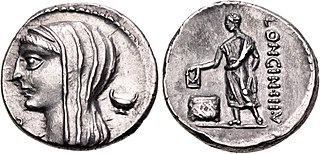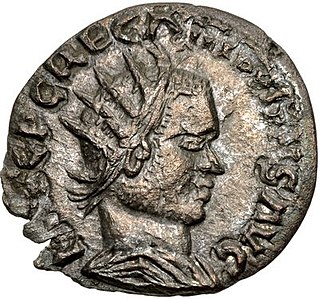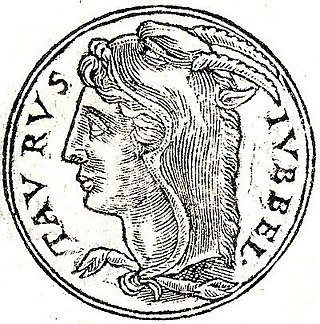Related Research Articles

The gens Petronia was a plebeian family at ancient Rome. This gens claimed an ancient lineage, as a Petronius Sabinus is mentioned in the time of Lucius Tarquinius Superbus, the last of the Roman kings, but few Petronii are mentioned in the time of the Republic. They are frequently encountered under the Empire, holding numerous consulships, and eventually obtaining the Empire itself during the brief reign of Petronius Maximus in AD 455.

The gens Claudia, sometimes written Clodia, was one of the most prominent patrician houses at ancient Rome. The gens traced its origin to the earliest days of the Roman Republic. The first of the Claudii to obtain the consulship was Appius Claudius Sabinus Regillensis, in 495 BC, and from that time its members frequently held the highest offices of the state, both under the Republic and in imperial times.

Legio XIV Gemina was a legion of the Imperial Roman army, levied by Julius Caesar in 57 BC. The cognomen Gemina (Twinned) was added when the legion was combined with another understrength legion after the Battle of Actium. The cognomen Martia Victrix was added following their service in the Pannonian War c. AD 9 and the defeat of Boudicca in AD 61. The emblem of the legion was the Capricorn, as with many of the legions levied by Caesar.

The gens Julia was one of the most prominent patrician families in ancient Rome. Members of the gens attained the highest dignities of the state in the earliest times of the Republic. The first of the family to obtain the consulship was Gaius Julius Iulus in 489 BC. The gens is perhaps best known, however, for Gaius Julius Caesar, the dictator and grand uncle of the emperor Augustus, through whom the name was passed to the so-called Julio-Claudian dynasty of the first century AD. The nomen Julius became very common in imperial times, as the descendants of persons enrolled as citizens under the early emperors began to make their mark in history.

The gens Cassia was a Roman family of great antiquity. The earliest members of this gens appearing in history may have been patrician, but all those appearing in later times were plebeians. The first of the Cassii to obtain the consulship was Spurius Cassius Vecellinus, in 502 BC. He proposed the first agrarian law, for which he was charged with aspiring to make himself king, and put to death by the patrician nobility. The Cassii were amongst the most prominent families of the later Republic, and they frequently held high office, lasting well into imperial times. Among their namesakes are the Via Cassia, the road to Arretium, and the village of Cassianum Hirpinum, originally an estate belonging to one of this family in the country of the Hirpini.

P. C. Regalianus, also known as Regalian, was Roman usurper for a few months in 260 and/or 261, during the Crisis of the Third Century, a period of intense political instability in the Roman Empire. Regalianus was acclaimed emperor by the troops along the Danube river, a region of the empire that frequently experienced barbarian raids, probably in the hope that he might be able to secure the frontier.

The gens Aurelia was a plebeian family at ancient Rome, which flourished from the third century BC to the latest period of the Empire. The first of the Aurelian gens to obtain the consulship was Gaius Aurelius Cotta in 252 BC. From then to the end of the Republic, the Aurelii supplied many distinguished statesmen, before entering a period of relative obscurity under the early emperors. In the latter part of the first century, a family of the Aurelii rose to prominence, obtaining patrician status, and eventually the throne itself. A series of emperors belonged to this family, through birth or adoption, including Marcus Aurelius and the members of the Severan dynasty.

The gens Licinia was a celebrated plebeian family at ancient Rome, which appears from the earliest days of the Republic until imperial times, and which eventually obtained the imperial dignity. The first of the gens to obtain the consulship was Gaius Licinius Calvus Stolo, who, as tribune of the plebs from 376 to 367 BC, prevented the election of any of the annual magistrates, until the patricians acquiesced to the passage of the lex Licinia Sextia, or Licinian Rogations. This law, named for Licinius and his colleague, Lucius Sextius, opened the consulship for the first time to the plebeians. Licinius himself was subsequently elected consul in 364 and 361 BC, and from this time, the Licinii became one of the most illustrious gentes in the Republic.

The gens Aquillia or Aquilia was a plebeian family of great antiquity at ancient Rome. Two of the Aquillii are mentioned among the Roman nobles who conspired to bring back the Tarquins, and a member of the house, Gaius Aquillius Tuscus, was consul in 487 BC.

The gens Calpurnia was a plebeian family at ancient Rome, which first appears in history during the third century BC. The first of the gens to obtain the consulship was Gaius Calpurnius Piso in 180 BC, but from this time their consulships were very frequent, and the family of the Pisones became one of the most illustrious in the Roman state. Two important pieces of Republican legislation, the lex Calpurnia of 149 BC and lex Acilia Calpurnia of 67 BC were passed by members of the gens.

The gens Marcia, occasionally written Martia, was one of the oldest and noblest houses at ancient Rome. They claimed descent from the second and fourth Roman Kings, and the first of the Marcii appearing in the history of the Republic would seem to have been patrician; but all of the families of the Marcii known in the later Republic were plebeian. The first to obtain the consulship was Gaius Marcius Rutilus in 357 BC, only a few years after the passage of the lex Licinia Sextia opened this office to the plebeians.

The gens Didia, or Deidia, as the name is spelled on coins, was a plebeian family at ancient Rome, which first appears in history during the final century of the Republic. According to Cicero, they were novi homines. Titus Didius obtained the consulship in 98 BC, a dignity shared by no other Didii until imperial times.

The gens Antonia was a Roman family of great antiquity, with both patrician and plebeian branches. The first of the gens to achieve prominence was Titus Antonius Merenda, one of the second group of Decemviri called, in 450 BC, to help draft what became the Law of the Twelve Tables. The most prominent member of the gens was Marcus Antonius.

The gens Maria was a plebeian family of Rome. Its most celebrated member was Gaius Marius, one of the greatest generals of antiquity, and seven times consul.
The gens Egnatia was a plebeian family of equestrian rank at ancient Rome. Only a few of the Egnatii held any magistracies, of whom the most important may have been Gnaeus Egnatius, who held the praetorship during the second century BC, and served as governor of Macedonia, shortly after its institution as a Roman province.
The gens Maenia, occasionally written Mainia, was a plebeian family at ancient Rome. Members of this gens are first mentioned soon after the establishment of the Republic, and occur in history down to the second century BC. Several of them held the position of tribune of the plebs, from which they strenuously advocated on behalf of their order. The most illustrious of the family was Gaius Maenius, consul in 338 BC, and dictator in both 320 and 314. In some manuscripts, the nomen Maenius appears to have been erroneously substituted for Menenius or Manlius; there are also instances of confusion with Manilius, Maelius, and Maevius.

The gens Nonia was a plebeian family at ancient Rome. Its members first appear in history toward the end of the Republic. The first of the Nonii to obtain the consulship was Lucius Nonius Asprenas in 36 BC. From then until the end of the fourth century, they regularly held the highest offices of the Roman state.

The gens Sentia was a plebeian family at ancient Rome. Members of this gens are first mentioned in history toward the end of the Republic. The first of the Sentii to obtain the consulship was Gaius Sentius Saturninus, in 19 BC.
The gens Statia was a minor plebeian family at ancient Rome. Members of this gens are first mentioned in the early decades of the Republic, but the name does not appear again in history until the time of Cicero. The Statii remained relatively undistinguished until the reign of Trajan, when Lucius Statius Aquila was raised to the consulship.

The gens Statilia was a plebeian family of Lucanian origin at ancient Rome. Members of this gens are first mentioned in the third century BC, when one of them led the Lucanian assault on the city of Thurii, and another commanded an allied cavalry troop during the Second Punic War; but at Rome the Statilii first come to attention in the time of Cicero, at which point they held equestrian rank. The first of the family to attain the consulship was Titus Statilius Taurus in 37 BC, and his descendants continued to fill the highest offices of the Roman state until the time of Marcus Aurelius.
References
- Pferdehirt, Barbara,"Vier neue Militärdiplome im Besitz des Römisch-Germanischen Zenralmuseums", Archäologisches Korrespondenzblatt, 2001.
- Eck, Werner, "Prosopographische Bemerkungen zum Militärdiplom vom 20.12.202 n. Chr. Der Flottenpräfekt Aemilius Sullectinus und das Gentilnomen des Usurpators Regalianus", Zeitschrift für Papyrologie und Epigraphik , 139 (2002), pp. 208–210.